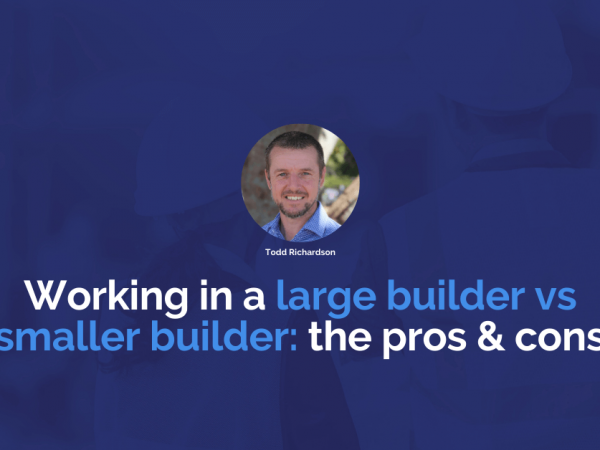How do you negotiate your salary? How do you justify your salary expectations? How do you determine fair value? How do you articulate your value to a company as to why you should receive a certain salary? Read on …

It’s an employee’s market, right?
Some may think that just because it’s a busy employment market, they should get a lot more money without a justification as to why. But the reality is that builders aren’t necessarily making more money in the current market. So, without offering any more value you could risk getting knocked back.
It’s important to not just start with saying that ‘the market pays XYZ, so I should receive XYZ’. The problem with that approach is you haven’t taken any effort to prove that the work you do is equal to the market. As a matter of fact, how do you prove you’re equal to or better than the market? Naming a few friends’ salaries is merely anecdotal and how does your employer judge your performance against someone they have never worked with? So merely saying what the market is paying is not a very strong argument.
Add value
Everyone in the same role will have a similar set of skills and responsibilities to you – so what makes you worth more than them? Therefore, when you go into a salary discussion, the references should be all about how you add value, not what the market is doing. You should be using real performance related arguments. Such as, explaining how on your last project, you achieved ‘XYZ’ and how that benefitted the company, or you completed tasks ‘ABC’, which were beyond your role requirements. In other words, talking to them about how you personally are adding additional value to the project and to them, whether that is your current employer or a prospective one.
So, the main emphasis should be to stick to the reasons you are successful in your job, how you add value to your job, and listing your achievements. You need to argue that that’s where your value is and that’s why they should pay more.
But how?
Another strong argument for a higher salary is the amount of extra responsibility you have taken on since your last review. Naturally, as you learn more you can do more and can become better at doing what you do, no matter what stage of your carer you’re in. For an existing employer, you need to be clear about the tasks you weren’t doing a year ago but are doing now. For a new employer, you need to be clear about what you can do now. Contributing more could be that you were a CA or PE who has started to take on some PM responsibilities on your projects. Or it could be simple things like being part of the QA Committee reviewing the QA Handbook. Anything that you can point to where you’ve extended yourself beyond your current role, and then saying that as you’re doing more, it’s fair that you should get some more.
These are the main things we recommend you prepare beforehand when entering the salary negotiation process, and if you show that you’ve thought about your value and why – then you’ll have a really strong argument. It’ll be very hard for an employer to knock you back, other than them saying it’s just not affordable or not within budget, but you will maximise what you can earn from that employer.
Side note
There are also a couple of other considerations to keep in mind too when negotiating as different offers come along for a new role.
-
- If a builder’s willing to pay you substantial amounts above your current salary, you’ve got to wonder why. What position have they put themselves in to justify paying you a lot more money? Could you be walking into a poorly run project that’s running behind time, and they desperately need help to get it back on track, and they’re happy to pay extra for it? So, when you assess an offer, you must also understand why they’re offering the higher amounts they are.
- You should research the market in terms of what other people are getting paid so that you know the figure you’re choosing is relevant. Before you approach the employer, you’ll want to know if you’re genuinely already underpaid, or if you’re overpaid, or somewhere in between.
You need to think about all of this well and truly before your negotiation and think of it as a debate. The employer will throw at you a whole bunch of cons, and you will need to argue your pros strongly.
Summary
Keep the discussion positive and focus on how you have been performing and what value that provides the company and its performance.
It allows you to demonstrate your impact on a business by telling the person about the achievements/challenges you have overcome, rather than just detailing your responsibilities, which everyone in your role has.
It doesn’t matter if you’re negotiating for a new job, or an existing one during a performance review – it’s still the same conversation. It’s vital not to be demanding but rather to prove your worth.
Looking for your next construction job? Search our current construction roles here, or to chat to our team about securing your next opportunity, get in contact with us through our Contact Us page.
Receive our updates straight to your inbox



